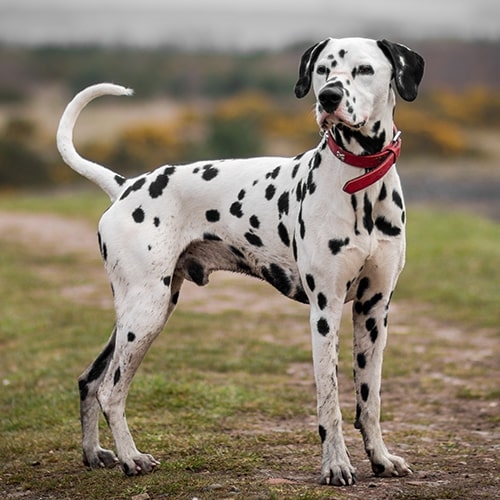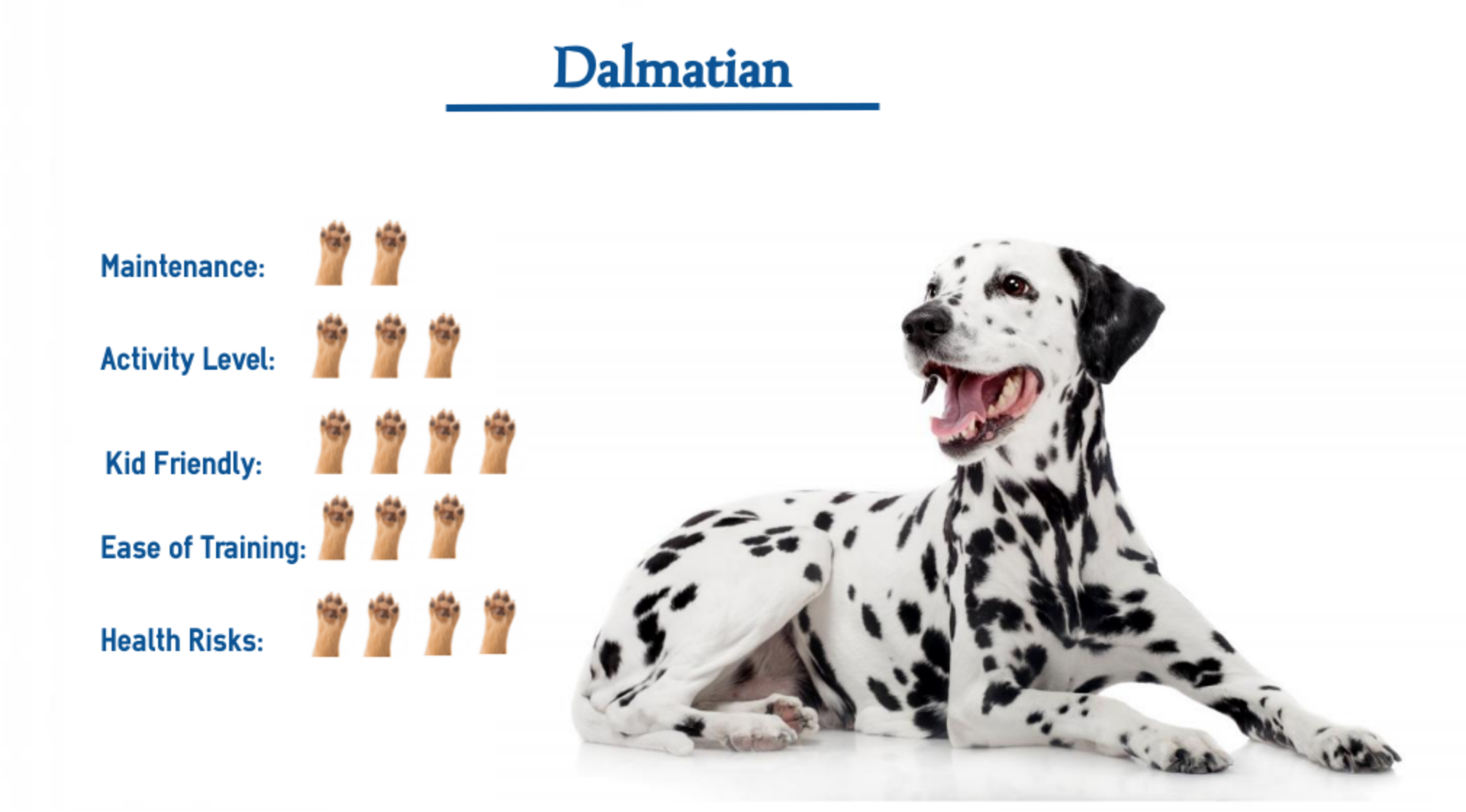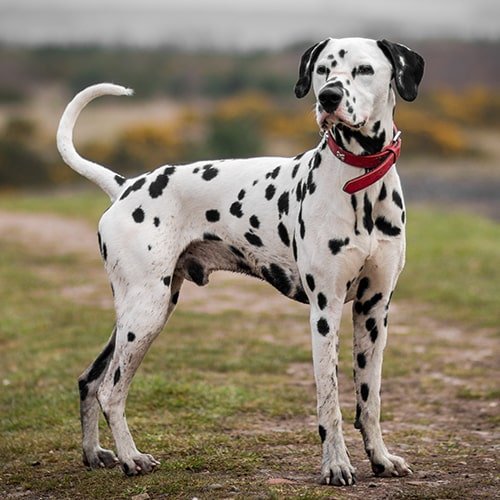Are you prepared to handle a canine tornado? Dalmatians may be known for their striking spots and iconic presence in movies like 101 Dalmatians, but they come with a reputation for boundless energy. These spirited dogs require consistent exercise and mental stimulation to prevent them from becoming a whirlwind of chaos in your home. So, before you fall in love with their unique beauty, ask yourself if you’re ready for a full-time playmate.
Dalmatians may be adorable, but they are not the easiest breed to raise. Originating from Croatia, these dogs were initially bred to be carriage dogs, guard dogs, and even firehouse mascots. Their history suggests a natural inclination for guarding and protecting, which can result in territorial behavior if not managed properly. Moreover, it’s important to note that Dalmatians have a higher predisposition to certain health issues like deafness, bladder stones, and skin allergies compared to other breeds. As such, potential owners should be aware of these potential challenges and be prepared to invest time, effort, and possibly money into their care. So, think twice before committing to a dalmatian, and ensure you have the resources to provide them with the love and attention they truly deserve.
Have you been considering getting a Dalmatian? While they may be known for their unique spotted coat and playful nature, there are some important reasons to think twice. Dalmatians require a lot of exercise and attention, making them unsuitable for busy or inexperienced owners. They are prone to certain health issues and may not get along with other pets. Additionally, their high energy level and need for mental stimulation can be a challenge for some households. Before committing to a Dalmatian, carefully consider these factors to ensure it’s the right fit for you and your lifestyle.

Why You Shouldn’t Get a Dalmatian? The Truth Behind This Popular Breed
Thinking of getting a new pet? Dalmatians might catch your eye with their unique spots and playful personalities, but before you make the decision to bring one into your home, it’s important to understand the potential challenges and considerations that come with owning this breed. While Dalmatians can make wonderful companions for the right owner, there are several reasons why you might want to think twice before getting a Dalmatian.
The High Energy Levels and Exercise Needs
Dalmatians are known for their boundless energy and require a significant amount of exercise to keep them happy and healthy. These dogs were originally bred to run alongside horse-drawn carriages, and their endurance and stamina are still deeply ingrained in their genetic makeup. If you lead a sedentary lifestyle or don’t have the time or commitment to provide them with the exercise and mental stimulation they need, a Dalmatian might not be the best fit for your lifestyle.
To meet the exercise requirements of a Dalmatian, expect to spend at least an hour or two each day engaging in vigorous physical activities such as running or playing fetch. Without this level of activity, Dalmatians can become bored, hyperactive, and may engage in destructive behaviors such as chewing or excessive barking. Keep in mind that their exercise needs extend beyond just daily walks and include opportunities for off-leash running and play.
Potential Health Issues
While Dalmatians may appear to be healthy and robust, they are prone to certain hereditary health conditions that potential owners should be aware of. One of the most well-known health issues in Dalmatians is urinary stones, which are commonly formed due to their unique uric acid metabolism. This condition can lead to urinary blockages and can be life-threatening if not properly managed.
In addition to urinary stones, Dalmatians are also susceptible to deafness, allergies, hip dysplasia, and various eye disorders. Regular veterinary check-ups and proper care are crucial to catching and managing these potential health issues early on. It’s essential to be prepared for the potential financial costs associated with healthcare and medical treatments for your Dalmatian throughout their life.
Socialization and Training Needs
Dalmatians are highly intelligent dogs, but they can also be independent and stubborn at times. Proper socialization and training from an early age are essential to ensure that they become well-behaved and obedient pets. Without proper training and guidance, Dalmatians may exhibit behavioral problems such as aggression, excessive barking, or destructive tendencies.
It’s important to note that Dalmatians thrive in households with consistent rules, positive reinforcement training methods, and lots of mental stimulation. They can be sensitive to harsh training techniques, so a gentle and patient approach is necessary. Additionally, providing opportunities for regular socialization with other dogs and new environments will contribute to a well-rounded and happy Dalmatian.
The Need for Attention and Stimulation
Dalmatians are known for their affectionate and loving nature, but they can also be demanding when it comes to attention and stimulation. These dogs thrive on human companionship and do not do well when left alone for long periods. If you have a busy or unpredictable schedule that prevents you from spending quality time with your pet, a Dalmatian may not be the best choice.
Keep in mind that Dalmatians require mental stimulation in addition to physical exercise. They excel in activities such as obedience training, agility courses, and even advanced tricks. Without adequate mental stimulation, Dalmatians may become bored or anxious, which can lead to behavioral issues. It’s important to ensure that you can provide the attention, time, and mental challenges that Dalmatians need to truly thrive as pets.
Dalmatians and Children
Dalmatians are often associated with the image of a friendly and loyal family pet, but it’s important to consider their compatibility with children carefully. While Dalmatians can indeed be wonderful companions for children, their energy levels and boisterous nature may not always be well-suited for households with very young children or those who are unable to handle their exuberance.
It’s crucial to teach children how to interact with Dalmatians appropriately and supervise their interactions to prevent accidents or injuries. Dalmatians are generally good-natured, but they can be jumpy or easily knocked over due to their high energy and size. If you have young children, it’s essential to ensure that both they and the Dalmatian are comfortable and safe in each other’s presence.
Key Takeaways: Why You Shouldn’t Get a Dalmatian
- Dalmatians are high-energy dogs that require a lot of exercise and attention.
- They have a strong prey drive and may not get along well with small animals.
- Dalmatians are prone to certain health issues, such as deafness and urinary problems.
- They require consistent training and socialization to prevent behavioral issues.
- Dalmatians have a reputation for being stubborn and independent, which can make them challenging to train.
Frequently Asked Questions
Welcome to our FAQ section on why you shouldn’t get a Dalmatian. Below, we’ve compiled some common questions people have when considering this breed. If you’re thinking about getting a Dalmatian, read on to find out important information you should know.
Are Dalmatians suitable for first-time dog owners?
While Dalmatians are beautiful and charismatic dogs, they may not be the best choice for first-time dog owners. Dalmatians require a lot of exercise, mental stimulation, and consistent training. This breed can be stubborn and independent, making them challenging to train for inexperienced owners. It’s crucial to research their needs and characteristics before committing to a Dalmatian puppy.
Additionally, Dalmatians tend to have high energy levels and need plenty of space to run around. They are not well-suited for apartment living or families with a sedentary lifestyle. Before getting a Dalmatian, make sure you have the time, resources, and knowledge to meet their specific needs.
Do Dalmatians have any health issues?
Yes, Dalmatians are prone to certain health issues that potential owners should be aware of. One of the most notable health concerns in this breed is deafness. Approximately 10-12% of Dalmatians are born deaf or develop hearing problems in both ears. Regular hearing tests are recommended for Dalmatians to detect any issues early on.
Another health concern in Dalmatians is urinary stones. This breed has a unique metabolism that can cause a buildup of uric acid in their urine, leading to the formation of stones. Proper feeding and regular veterinary check-ups are essential to manage this condition and prevent any complications.
What is the grooming routine for Dalmatians?
Dalmatians have a short, dense coat that looks effortless to maintain, but they do require regular grooming. Their coat sheds moderately year-round, so weekly brushing is necessary to control hair shedding and keep their coat healthy.
In addition to brushing, Dalmatians also benefit from regular baths to keep their coat clean. However, it’s important to use a gentle shampoo specifically formulated for dogs, as their skin can be sensitive. Lastly, make sure to trim their nails regularly, check their ears for any signs of infection, and brush their teeth to maintain overall hygiene.
Are Dalmatians good with children?
Dalmatians can be good with children, but it depends on the individual dog and how they are raised. Dalmatians are generally friendly and outgoing, which can make them good companions for kids. However, they may not tolerate rough play or excessive handling, so supervision is crucial when children are interacting with them.
It’s important to socialize Dalmatians with children from an early age and teach both the dog and the child how to interact respectfully. Additionally, Dalmatians have a playful nature and require regular exercise, which can be a great way for children to bond and engage with them.
Do Dalmatians have any specific training needs?
Yes, Dalmatians have specific training needs that should not be overlooked. This breed is highly intelligent but can be willful and independent, making early training crucial. Positive reinforcement methods, such as using treats and praise, work best with Dalmatians, as they respond well to rewards.
Consistency is key when training a Dalmatian, as their independent nature means they may test boundaries. They also require mental stimulation, so incorporating puzzle toys or agility exercises into their training routine can be beneficial. Working with a professional trainer can also help guide you through the training process and address any specific behavior concerns.

The truth about Dalmatians | Beautiful dog breed
Summary
Thinking about getting a Dalmatian? Well, here’s some important stuff to consider. Dalmatians require a lot of exercise, so you’ll need to be active. They also have a tendency to be stubborn and may be challenging to train. Plus, they can have health problems like deafness and urinary issues. If you aren’t prepared for these challenges, a Dalmatian might not be the best pet for you. It’s important to research and think carefully before making any decisions about getting a dog.
